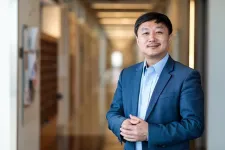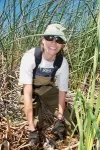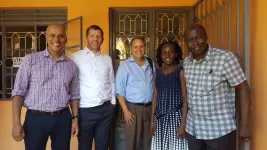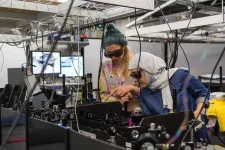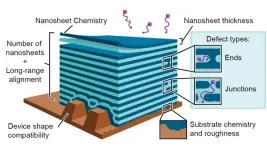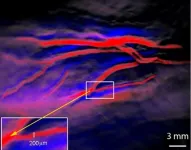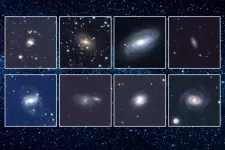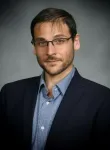(Press-News.org) The Chicago-based Great Lakes ReNEW coalition has been awarded one of the largest, if not the largest, climate awards in the city’s history – up to $160 million over 10 years as one of the inaugural U.S. National Science Foundation’s Regional Innovation Engines.
Authorized in the “CHIPS and Science Act of 2022,” the NSF Engines program is designed to support the development of diverse regional coalitions of universities, local governments, the private sector and nonprofits to create solutions to today’s pressing issues.
Selected from an initial pool of more than 700 submissions from across the nation, Great Lakes ReNEW was named one of the first cohort on Monday, Jan. 29.
If the award is large, the task is pharaonic: Recycle the used water to create a clean water resource, use the contaminants to build clean energy batteries, and solve one of humanity’s biggest challenges.
For Junhong Chen, Crown Family Professor at the Pritzker School of Molecular Engineering at the University of Chicago and Lead Water Strategist at Argonne National Laboratory, the announcement is the culmination of years of effort – and the promise of years more important work ahead on a critical task. Chen is the co-Principal Investigator and Use-Inspired R&D Lead for Great Lakes ReNEW.
A water-quality expert with decades of expertise in real-time water quality monitoring and detection, Chen provided the scientific vision for the project.
“Water is needed everywhere for daily life. For manufacturing in particular, it is critical to our economic prosperity. But water is limited in supply, especially freshwater,” Chen said. “The only way to get us out of this challenge is to be able to recycle and reuse the water.”
Waste into Wealth
Chen heads the ReNEW program along with PI Alaina Harkness, the Executive Director of the nonprofit Current, which received the NSF award.
“This is truly a moonshot moment for the Great Lakes and Midwest climate leadership,” Harkness said. “A bipartisan coalition of three governors and organizations from six states aligned to bring Great Lakes ReNEW to life. We were ambitious; we were inclusive; and we were organized during the proposal effort. That will be our recipe for successful implementation.”
The group took a collaborative approach in designing its plans to turn “waste into wealth.”
“The UChicago Pritzker School of Molecular Engineering is home to big thinking and positive impact, and it is entirely fitting that one of our professors is a force behind this transformative step for the Great Lakes Region and beyond,” said PME Dean Nadya Mason. “Junhong Chen’s scientific vision and the work that will be done by Currents will enable cleaner water and generate more natural resources – providing both job creation and a more sustainable future for all. This extraordinary effort highlights the interdisciplinary ideals on which PME is founded: Working together gets results.”
Great Lakes ReNEW’s approach to, in Chen’s words, “recycling the water” will require stripping out dangerous “forever chemicals” such as per- and polyfluoroalkyl substances (PFAS), a group of synthetic chemicals used to make many consumer products. The task also will include transforming filtered-out waste metals into new types of batteries that help power the nation’s switch to clean energy. And it will require removing agricultural runoff such as phosphates and nitrates from the water supply, putting them to productive use fertilizing new rounds of crops. Cutting carbon emissions, protecting public health and revitalizing local communities are all part of the process.
“In order to recycle or reuse the fresh water, we need to take out everything else except benign constituents such as the H2O and good minerals,” Chen said. “But treating water itself is energy intensive. In the United States, we're using 3% of our electricity for wastewater treatment. That's quite a lot.”
Reducing that 3% means not only saving money, but also eliminating the carbon emissions created while producing that electricity.
“This work is all tied to our national and global goal of net-zero emissions by 2050,” Chen said. “Climate change decarbonization is tied to our end goal, in addition to addressing the freshwater challenge now.”
The initial service area will be Illinois, Wisconsin and Ohio, with Chicago, Milwaukee and Cleveland serving as “anchor cities,” but it will expand to include Michigan, Indiana and Minnesota over the collaborative agreement’s 10-year run.
“The Great Lakes are a vital natural resource for the health, wealth, and security of our entire nation,” said Illinois Gov. J.B. Pritzker. “That’s why I’m thrilled that Current was selected to receive this federal award that will help transform our Great Lakes region. Thanks to investments like these, our top-tier workforce, and our industrial resources, we’re leading the clean water and energy revolution.”
Everything but the water
Stripping everything from the water but the water is a massive endeavor. It not only requires scaling and leveraging existing technologies but expanding the development of new ones in the region’s universities, research labs and private sector companies.
This interdisciplinary approach already has tapped expertise across the UChicago Pritzker School of Molecular Engineering, with Chen enthusiastic about further opportunities.
“We're hoping to work in three major R&D directions. One is on materials platforms that will allow us to selectively separate these different components. The second direction is to explore novel processing technologies – biological processes, for example – to achieve the same goal of precision separation,” Chen said. “And finally, along the way, we have to be able to monitor these various components to ensure our processes are working. That's where the real-time sensor network would come in.”
In addition to his own work on real-time sensor networks, Chen already has found willing collaborators.
“In our advanced materials for sustainability theme, Pritzker Molecular Engineering has a number of faculty members whose work can contribute to this effort, including professors Chong Liu, Stuart Rowan, Matt Tirrell and others who are focusing on materials that lead to selective separation,” Chen said. “Certainly, I and colleagues such as Supratik Guha can contribute to the detection side.”
Chen is working to expand such partnerships across the broader UChicago community, citing collaborative opportunities with PME Assoc. Prof. Andrew Ferguson on machine learning, Prof. Steven Sibener of UChicago’s Chemistry Department on water materials characterization, PME’s Educational Outreach programs on inclusive circular blue economy workforce development and the Polsky Center for Entrepreneurship and Innovation on water technology translation.
Chen cited his own position – a joint appointment between a private university and a national laboratory – as the template for the type of partnerships needed to recycle the Great Lakes and to face other grand challenges.
“Our unique organizational structure at the Pritzker School of Molecular Engineering means we look at challenges through the lens of multiple science and engineering disciplines,” Chen said. “This creates a broad solution-oriented mindset. Combined with our close partnership with Argonne National Laboratory, we are together able to create an outsized impact on a critical challenge – clean water – that will benefit the region, the nation, and ultimately, we hope the world.”
The $160 million over 10 years from the NSF will be bolstered by an initial $2 million State of Illinois investment.
END
UChicago engineer driving key role in Great Lakes water transformation
Professor Junhong Chen at the Pritzker School of Molecular Engineering holds a leading role in unprecedented $160M federal climate award
2024-01-29
ELSE PRESS RELEASES FROM THIS DATE:
Hydroxyurea significantly reduces infections in children with sickle cell anemia
2024-01-29
INDIANAPOLIS -- Clinical research led by Indiana University School of Medicine investigators and their collaborators in Uganda has revealed that hydroxyurea significantly reduces infections in children with sickle cell anemia. Their latest findings enhance strong evidence of hydroxyurea’s effectiveness and could ultimately reduce death in children in Africa, the continent most burdened by the disease.
The group’s research, recently published in the journal Blood, revealed that hydroxyurea treatment resulted in a remarkable ...
University of Manchester and SPIE announce $1 million endowment for postgraduate scholarships
2024-01-29
The University of Manchester and SPIE, the international society for optics and photonics have announced the establishment of the SPIE-Manchester Postgraduate Scholarship in Photonics.
The $500k gift from the SPIE Endowment Matching Program will be matched 100% by the University and will be used to support both early-career and returning researchers from the University’s Photon Science Institute in partnership with the Royce Institute, the UK’s national institute for advanced materials research and innovation.
The partnership was announced today (29 January) during the SPIE Photonics West conference in San Francisco.
Photonics is the study of light and its interactions ...
Argonne scientists help scale up nanomaterials for sustainable manufacturing
2024-01-29
New material is self-assembling, long-lasting and recyclable.
As electronic devices get smaller, the materials needed to create them get smaller as well. Nanoscience is the study of extremely small materials that find uses in energy storage, electronics, health and safety applications and more.
Now a team led by the U.S. Department of Energy’s (DOE) Lawrence Berkeley National Laboratory has developed a new self-assembly method to fabricate multilayered 2D nanosheets. A nanosheet is an extremely small, lasagna-like material made of ultrathin layers of polymers and nanoparticles.
These nanosheets have significantly ...
OU scientists tests revolutionary imaging technique for pancreatic cancer
2024-01-29
Researchers at OU Health Stephenson Cancer Center at the University of Oklahoma Health Sciences have embarked on a revolutionary new research study that could improve the detection of a deadly disease — pancreatic cancer — and give patients a chance to live longer, healthier lives.
The research focuses on an innovative combination of imaging techniques: a newly created contrast agent that recognizes pancreatic cancer cells, paired with Multispectral Optoacoustic Tomography, or MSOT. Together, the approach can detect pancreatic cancer cells the width of an eyelash ...
Rising sea levels could lead to more methane emitted from wetlands
2024-01-29
As sea levels rise due to global warming, ecosystems are being altered. One small silver lining, scientists believed, was that the tidal wetlands found in estuaries might produce less methane – a potent greenhouse gas – as the increasing influx of seawater makes these habitats less hospitable to methane-producing microbes.
However, research from biologists at Lawrence Berkeley National Laboratory (Berkeley Lab) and UC Berkeley indicates that these assumptions aren’t always true. After examining the microbial, chemical, and geological features of 11 wetland zones, the team found that a wetland region exposed ...
Study urges people to think twice before going on a diet
2024-01-29
A new qualitative study highlights the negative interpersonal and psychological consequences associated with “yo-yo dieting,” also known as weight cycling. The work underscores how toxic yo-yo dieting can be and how difficult it can be for people to break the cycle.
“Yo-yo dieting – unintentionally gaining weight and dieting to lose weight only to gain it back and restart the cycle – is a prevalent part of American culture, with fad diets and lose-weight-quick plans or drugs normalized as people pursue beauty ...
Astronomers spot 18 black holes gobbling up nearby stars
2024-01-29
Star-shredding black holes are everywhere in the sky if you just know how to look for them. That’s one message from a new study by MIT scientists, appearing today in the Astrophysical Journal.
The study’s authors are reporting the discovery of 18 new tidal disruption events (TDEs) — extreme instances when a nearby star is tidally drawn into a black hole and ripped to shreds. As the black hole feasts, it gives off an enormous burst of energy across the electromagnetic spectrum.
Astronomers have detected previous tidal disruption events by looking for characteristic bursts in the optical and X-ray bands. To date, these searches have ...
The DiAL-Health study will help determine how intermittent fasting and calorie counting can improve a person’s “healthspan”
2024-01-29
January is a time when many people are looking for new diet routines, and intermittent fasting is trending, as are traditional calorie cutting programs.
Research conducted with animal models suggests that intermittent fasting slows aging, and those animals live longer. Researchers at the Pennington Biomedical Research Center and the University of Alabama at Birmingham are conducting the DiAL-Health study to see if eating for 8 hours and fasting for 16 each day shows similar results in people. These researchers ...
From simulation to reality: Making social media a safer space for kids through AI
2024-01-29
Like it or not, social media has become the new mall for kids. It’s where they want to be, and it’s a place they can easily go—often with no guidance, no oversight, and no guardrails. And when the content gets ugly or confusing or weird, it can be tough for them to know what to do.
Dominic DiFranzo, an assistant professor of computer science and engineering in Lehigh University’s P.C. Rossin College of Engineering and Applied Science, has devoted his research to helping kids better navigate the perils of social media. He and his team have recently received two grants from the National Science Foundation to develop artificial intelligence tools ...
Shah studying fingerprinting technology for enhancing 5G/NextG O-RAN supply chain risk management
2024-01-29
Vijay Shah, Assistant Professor, Cybersecurity Engineering, received funding for the project: "Fingerprinting Technology for Enhancing 5G/NextG O-RAN Supply Chain Risk Management."
In this project, Shah is focusing on distinctive power signatures and electromagnetic emanations to fortify supply chain risk management of 5G/Next G networks.
This technology has the potential to create a robust framework for comprehensive validation and testing across the entire lifespan of deployed Open Radio Access Network (O-RAN) systems. This, in turn, could ...
LAST 30 PRESS RELEASES:
Alkali cation effects in electrochemical carbon dioxide reduction
Test platforms for charging wireless cars now fit on a bench
$3 million NIH grant funds national study of Medicare Advantage’s benefit expansion into social supports
Amplified Sciences achieves CAP accreditation for cutting-edge diagnostic lab
Fred Hutch announces 12 recipients of the annual Harold M. Weintraub Graduate Student Award
Native forest litter helps rebuild soil life in post-mining landscapes
Mountain soils in arid regions may emit more greenhouse gas as climate shifts, new study finds
Pairing biochar with other soil amendments could unlock stronger gains in soil health
Why do we get a skip in our step when we’re happy? Thank dopamine
UC Irvine scientists uncover cellular mechanism behind muscle repair
Platform to map living brain noninvasively takes next big step
Stress-testing the Cascadia Subduction Zone reveals variability that could impact how earthquakes spread
We may be underestimating the true carbon cost of northern wildfires
Blood test predicts which bladder cancer patients may safely skip surgery
Kennesaw State's Vijay Anand honored as National Academy of Inventors Senior Member
Recovery from whaling reveals the role of age in Humpback reproduction
Can the canny tick help prevent disease like MS and cancer?
Newcomer children show lower rates of emergency department use for non‑urgent conditions, study finds
Cognitive and neuropsychiatric function in former American football players
From trash to climate tech: rubber gloves find new life as carbon capturers materials
A step towards needed treatments for hantaviruses in new molecular map
Boys are more motivated, while girls are more compassionate?
Study identifies opposing roles for IL6 and IL6R in long-term mortality
AI accurately spots medical disorder from privacy-conscious hand images
Transient Pauli blocking for broadband ultrafast optical switching
Political polarization can spur CO2 emissions, stymie climate action
Researchers develop new strategy for improving inverted perovskite solar cells
Yes! The role of YAP and CTGF as potential therapeutic targets for preventing severe liver disease
Pancreatic cancer may begin hiding from the immune system earlier than we thought
Robotic wing inspired by nature delivers leap in underwater stability
[Press-News.org] UChicago engineer driving key role in Great Lakes water transformationProfessor Junhong Chen at the Pritzker School of Molecular Engineering holds a leading role in unprecedented $160M federal climate award
